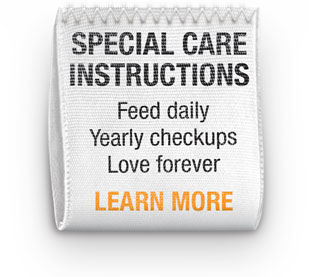
Why A Checkup?
A yearly veterinary checkup is the best way to keep your pet as healthy as possible – because it’s much easier to prevent disease than to treat it. So, whether your dog frolics at the park with all the neighborhood pups, or the closest your cat gets to the great outdoors is a sunny windowsill, every pet needs to see their veterinarian – at least once a year!
Remember: Pets age faster than we do, so missing even one yearly checkup can be like us not visiting a doctor for over five years!
What Your Veterinarian Looks For
A checkup is about way more than shots. From nose to tail, here are some things your veterinarian looks for during an annual checkup:
Select one of the animals below
What To Ask Your Veterinarian
It’s important to talk to your veterinarian about what you can do to keep your best friend happy and healthy. Here are some questions to ask at your next checkup. And remember, if you ever have a specific question or concern about your pet’s health, call your veterinarian right away!
Preventive
Healthcare Plans
Some veterinarians offer payment plans to help spread the cost of preventive healthcare over time. Ask your veterinarian about available plans when you call to schedule your appointment. And, if you’re looking to purchase pet insurance, www.naphia.org is a great source of information.
Select one of the animals below
Fun Facts!
Pets are good for you!
We’re talking about the importance of annual checkups for your pets. But did you know that living with a pet improves your health?
Bye-bye blues
Spending time with a pet can help you shake (or even avoid) depression. Unconditional love keeps people positive, and even looking at your pet increases the amount of Oxytocin, a ‘feel good’ chemical, in your brain.
Heart health
Just petting your dog or cat can lower your heart rate and blood pressure! And some studies have shown that pet owners have slightly lower cholesterol and are more likely to survive a heart attack.
Walk the block
People with dogs tend to get more exercise, and meet more neighbors, than folks without a furry friend. Exercise and social interaction are both great ways to reduce stress and lower the risk of cardiovascular disease.
Survival of the fittest
You notice every little thing your pet does – but did you know that dogs and cats have evolved to hide illness? Showing weakness makes an animal – and their pack – vulnerable, so our best friends do everything they can to keep a stiff upper lip. Your veterinarian can find problems your pet hides – another reason why annual checkups are so important!
Snacks add up
You love your dog – and your dog LOVES treats! But feeding Fido ‘human food’ isn’t always the greatest idea. We’re not talking apple slices here…we’re talking cookies, cheese and hot dogs. Take a look at how the calories can add up!
Snack (fed to a 20 lb. dog) / Human Caloric Equivalent
|
1 Small Cookie
|
= |
1 Hamburger
|
|
1 oz. Cheddar Cheese
|
= |
1½ Hamburgers
|
|
1 Hot Dog
|
= |
2½ Hamburgers
|
Remember: what seems like a little treat to you is like a whole meal to your dog!
Kitty calories
We’re not saying to never, ever treat your baby, but talk to your veterinarian about the best way to reward your little hunter! Take a look at how common treats can pack on the pounds.
Cheese
Just two slices can add around 125% to a small cat’s daily caloric intake. For larger cats, it’s about a 60% increase.
Tuna
A single can of tuna might add between 15% and 35% to your cat’s daily caloric intake.
Whole Milk
Just ½ a cup can add almost 50% to a small cat’s daily caloric intake, and almost 25% to a larger cat’s.
Find A Veterinarian
You probably have a veterinarian you love – but if you’re looking for a veterinarian, you can find one here. Veterinarians are committed to preventive healthcare and to working with you to help your pet live the longest, healthiest life possible!
Who is Partners for Healthy Pets
Partners for Healthy Pets is a committee of the non-profit American Veterinary Medical Foundation dedicated to improving the health and wellbeing of America’s pets through regular preventive healthcare. The American Veterinary Medical Association, the American Animal Hospital Association, and other leaders in veterinary medicine support Partners for Healthy Pets. Want to know more? Talk to your veterinarian or visit www.partnersforhealthypets.org

